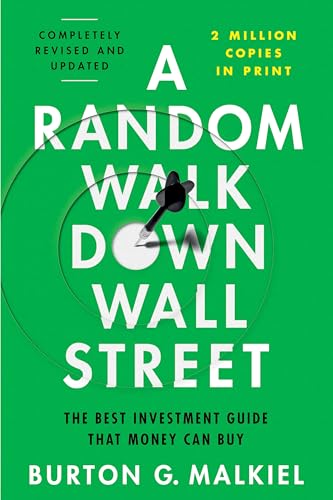A Random Walk Down Wall Street: The Best Investment Guide That Money Can Buy (Thirteenth)
amazon.com
A Random Walk Down Wall Street: The Best Investment Guide That Money Can Buy (Thirteenth)

I have argued in earlier chapters that the core of every investment portfolio should consist of low-cost, tax-efficient, broad-based index funds. By holding a portfolio containing all the stocks in the market, in proportion to their relative size or capitalization (the number of shares outstanding times the price of their shares), the investor
... See moreThe U.S. stock market may have averaged over 9 percent a year over long periods of time, but only with tremendous volatility, including years when investors have lost as much as 40 percent of their capital. The only way Madoff could report such a performance was by cooking the books. And don’t count on the regulators to protect you from such
... See moreMy advice is that you should not buy IPOs at their initial offering price and that you should never buy an IPO just after it begins trading at prices that are generally higher than the IPO price. Historically, IPOs have been a bad deal. In measuring all IPOs five years after their initial issuance, researchers have found that IPOs underperform the
... See moreIn some cases it may be impossible to find stock to borrow, and thus it may be technically impossible or prohibitively expensive to execute a short sale. In some of the most glaring examples of inefficient pricing, constraints on short selling prevented arbitrageurs from correcting mispricings.
And the hedge fund Melvin Capital lost half of its $13 billion capital from its short position in GameStop during the 2021 meme stock craze.
The market can remain irrational longer than the arbitrageur can remain solvent. This is especially true when the arbitrageur is credit constrained.
Since the errors of irrational investors do not cancel out but often reinforce each other, especially in the era of social media, how can stocks be efficiently priced? Believers in efficient markets rotely state that “arbitrage” will make the market efficient even if many individual investors are irrational. Arbitrageurs, such as hedge-fund
... See moreThis reluctance to take losses is clearly non-optimal according to rational investment theory and stupid in commonsense terms. Selling stocks with gains (outside tax-advantaged retirement accounts) involves paying capital gains taxes. Selling stock on which losses have been realized involves reducing taxes on other realized gains or a tax
... See moreMany investors may feel that if they hold on to a losing position, it will eventually recover and feelings of regret will be avoided. These emotions of pride and regret may be behind the tendency of investors to hold on to their losing positions and to sell their winners.